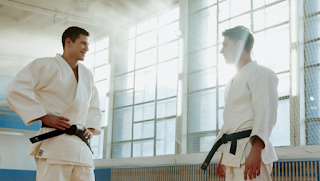When I thought about it, even I have a hard time establishing my reasons for doing budo in a set of short, simple sentences. So why even ask when I can’t answer my own question succinctly? And why ask the other questions if the case is that more often than not, I allow students to train, usually regardless of their social status or occupation?
The reason that’s not so apparent is that in the asking, I’m not just recording the quantitative answers: what your job is, what prior training you’ve done, why you want to train (even if you struggle on that last answer). I’m looking at your answers in a qualitative way. How are you answering the questions? What kind of emotional and personality traits are you exhibiting when you talk about yourself, past teachers, past training? Are you SAYING all the right words, but are your mannerisms and body language in opposition to the words coming out of your mouth? Then there’s something not quite right with what you’re saying.
Two people can say the same things, but how they say it and their body language may tell me totally different things about those two.
“Oh, I trained/am still training in X martial arts, but I’m really not that good at it…” That’s the usual way people will talk about their martial arts experience. There’s humble, though, and there’s false humility. One person can smile self-deprecatingly, shake his head, and the entire body language will show humility and a willingness to learn something new. Another person, like a short-term student I encountered some months ago, said the right words, but he puffed out his chest, stuck his chin out and looked down his nose when he said it, as if his words were saying, “I’m humble and willing to learn,” but his body was saying “But I’m a badass!” He didn’t last all that long. His cup was too full, and he had a hard time adjusting to our training. Moreover, he didn’t think anything about showing up with patches up and down his training outfit promoting his other martial arts style. And he wasn’t a badass. He was just bad.
In a way, talking to prospective new students is like speed dating. How do you get a handle on this new person in only a few minutes, who might barge into your life and stick around every training session, three hours a week, week in and week out, through a cursory interview? You can end a speed date right away if your creep-o-meter senses that the potential partner is a jerk. But a jerk in the dojo may hang around for a long time.
And if you are that new student, are you self-aware enough to know what kind of impression you are conveying to other people, not just in the dojo, but also in the rest of your life? Is that impression positive or negative? Are your words saying one thing, but is your body language giving away your true nature, and is that nature something you actually like or is it time for a change in attitude?
Ready to Start Earning Your Martial Arts Rank Certficate?
If you have the who, what, and why, we want to have you at SMAA!
At our dojo, you have your choice of five different divisions of Japanese martial arts. To start your journey towards an official martial arts rank certificate, call 734-720-0330 or submit a contact form here!












No comments:
Post a Comment